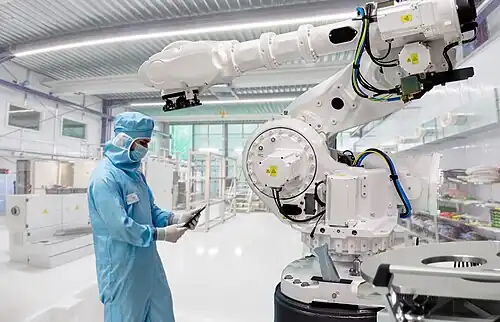Digital Media Concepts/Video Streaming Services
Digital Media Concepts/ Impact AI has on the job market
Introduction
Artificial Intelligence (AI) is transforming the job market in significant ways, creating both opportunities and challenges for workers across various industries. As automation and machine learning become more sophisticated, many routine tasks are being replaced by AI-driven processes. While this shift enhances productivity and efficiency, it also raises concerns about job displacement. Certain sectors, such as manufacturing and customer service, are particularly vulnerable to AI-driven automation. However, AI is also generating new job roles that require advanced technical skills and human oversight.
Job Displacement Due to AI

AI-powered automation is replacing many repetitive and low-skill jobs, especially in sectors like retail, transportation, and data entry. Machines and algorithms can now perform tasks that once required human labor, reducing the need for a large workforce. This has led to concerns about unemployment and the need for workforce adaptation. While automation increases efficiency, it also disproportionately affects workers with limited access to education and training. Governments and companies must develop strategies to reskill and support workers affected by AI-driven displacement.[1]
Job Creation and Emerging Roles
Despite concerns about job losses, AI is also creating new career opportunities in technology-driven industries. Professions such as AI ethics consultants, machine learning engineers, and data analysts have emerged due to the demand for AI expertise. Additionally, AI is augmenting human capabilities rather than fully replacing them in fields like healthcare, finance, and cybersecurity. Workers who acquire skills in AI development and human-AI collaboration are more likely to thrive in the evolving job market. Investing in education and continuous learning is crucial for individuals seeking to adapt to AI-driven changes.[2]
AI's Influence on Workplace Dynamics
AI is reshaping workplace environments by automating administrative tasks and optimizing decision-making processes. AI-driven tools help businesses streamline operations, improve customer interactions, and enhance data-driven decision-making. While this improves efficiency, it also raises ethical concerns regarding privacy, surveillance, and biases in AI systems. Employers must ensure that AI is implemented responsibly and transparently to maintain trust among employees and customers. Balancing AI integration with human involvement remains essential for creating an ethical and sustainable workplace.[3]
References
1:"The Impact of AI on Job Roles, Workforce, and Employment: What You Need to Know". Innopharma Education. 2023-09-29. Retrieved 2025-03-31.
2: "Emerging Job Roles and Trends: Navigating the Future of Work". www.usebraintrust.com. Retrieved 2025-03-31.
3:May 2024, Matt Dean 24. "What impact might AI have on workplace dynamics?". www.peoplemanagement.co.uk. Retrieved 2025-03-31.
- ↑ "The Impact of AI on Job Roles, Workforce, and Employment: What You Need to Know". Innopharma Education. 2023-09-29. Retrieved 2025-03-31.
- ↑ "Emerging Job Roles and Trends: Navigating the Future of Work". www.usebraintrust.com. Retrieved 2025-03-31.
- ↑ May 2024, Matt Dean 24. "What impact might AI have on workplace dynamics?". www.peoplemanagement.co.uk. Retrieved 2025-03-31.